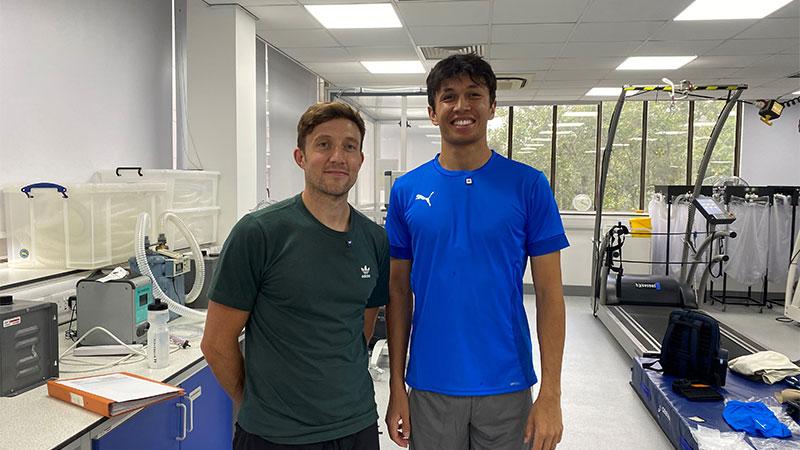Westminster Lecturer in Sport and Exercise Physiology Paul Hough, and Sports and Exercise Nutrition MSc student Gareth Bowen, led Formula 1 driver Alex Albon through heat acclimation training at the University’s Human Performance Lab to help prepare him for the Singapore Grand Prix – the hottest track on the F1 calendar.

Heat acclimation training is the artificial exposure to heat during exercise. Exercising in such hot and humid conditions increases the body temperature, induces heavy sweating and increases skin blood flow, all of which help increase the athlete’s tolerance to heat and reduces their risk of heat illnesses.
Hough and Bowen monitored the driver while he cycled in the 35-degree heat chamber for just under an hour. They measured his body mass and the amount of liquid in his drinks bottle before and after he exercised to estimate his sweat loss during the session.
During the session, Hough measured Albon’s heart rate and asked the driver about his levels of exertion and comfort in the intense conditions Hough also took blood samples to measure his lactate. Lactate is produced all the time, but muscles produce more during exercise. Lactate is transported around the body through the blood, and higher levels of lactate in the bloodstream indicate the athlete is exercising intensely.
Hough said: "It was great to work with Alex again, helping him to prepare for the Grand Prix in Azerbaijan and Singapore. In one session, he pushed himself particularly hard by doing high-intensity intervals in the heat chamber. This type of training is really challenging as the physical stress is magnified by the heat.”
Gareth Bowen added: “It was fantastic to support heat acclimation training sessions with an elite athlete in the University laboratory. It’s great that we have the facilities to support this type of assessment and training for athletes. It was also incredible to see how well Alex coped with intense sprint intervals on the cycle ergometer at such a high temperature and humidity.”
The University’s Human Performance Lab directly contributes to the United Nations Sustainable Development Goal (SDG) 3: Good Health and Wellbeing. Since 2019, the University of Westminster has used the SDGs holistically to frame strategic decisions to help students and colleagues fulfil their potential and contribute to a more sustainable, equitable and healthier society.
Find out more about studying Sports and Exercise Nutrition MSc at the University of Westminster.


